One of the many tasks in project management is to quickly identify bottlenecks in the project. And - in the ideal world - to prevent risks so that problems do not arise in the first place, in order to avoid delays.
There are several approaches / considerations for this during planning. For example:
- Do the time estimates contain enough buffer?
- Is the budget calculated accordingly?
- Are critical tasks started as early as possible?
- Do other day-to-day activities need to be completed in addition to project tasks?
- Can / should several tasks be worked on in parallel?
No matter what the project planning ultimately looks like. There are usually several factors to be considered and monitored by you as project manager.
To make this task easier for you, you should use tools that support you in this. If you already work with Redmine Reporting and Redmine HRM Plugin, then you will learn in this article which functions are useful for you and which Redmine areas you should regularly consult.
Useful Redmine Reporting functions
The Reporting plugin provides useful functions and additional filters and options to make problem detection easier for your.
To identify (possible) problems in project management using Redmine Reporting you should take a closer look at the following areas in your Redmine:
1. Project roadmap
Many people tend to always postpone tasks until the last minute (Procrastination). This is no different within projects.
That’s why you have to make sure that critical tasks in a project are completed as early as possible. Otherwise, the whole process will come to a halt sooner or later.
What you should do
Identify critical tasks in your project. Schedule them early with the help of the roadmap. Use meaningful names for them (e.g. Phase 1, Phase 2, etc.).
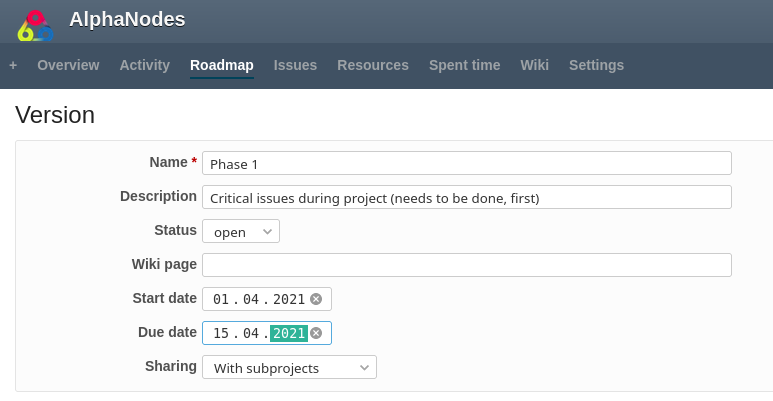
Make sure that the time periods for individual phases are not too long. And always keep an eye on the completion of the individual phases using the version list.
The version list is the central point of contact for all versions existing in Redmine. It can be accessed project wide via the App menu Version list.
2. Version list
To keep an eye on critical task packages you have created via roadmap, use the various filters and options of the version list (Reporting function).
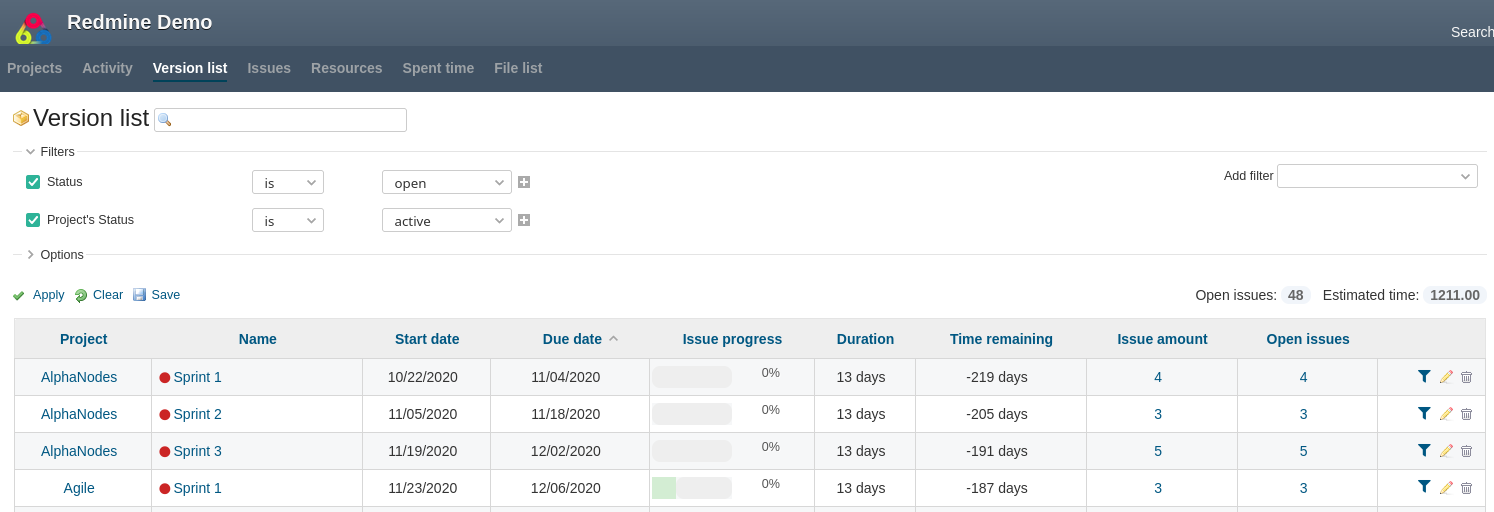
Sort your versions according to due date, to see, if they are completed in order of date.
Possible goals
The version list gives you an insight into the completion status of individual task packages. Information provided by the version list are vor example:
- Which task packages are on schedule?
- Which are due / overdue / how long?
- In which order is the processing necessary? etc.
What you should do
Filter the list for your purpose and activate necessary columns and save them as custom query for later usage. Interesting columns for deeper insights are e.g.:
- Due date
- Issue progress
- Duration
- Time remaining
- Issue amount
- Open issues
3. Task list
To keep an eye on critical tasks you should adjust the issue list a bit. The Reporting plugin provides some useful filters and options to do so.
Possible goals
The issue list gives you an insight into the completion status of individual tasks assigned to your team members:
- What is the current status and progress of a single issue?
- Who is the issue assigned to?
- How much time has already been spent on an issue?
- Is the spent time within the estimated time range? etc.
What you should do
Filter the list for your purpose and activate necessary columns and save them as custom query for later usage. Interesting filters and columns are, for example:
- Issue lifetime
- Round trips
- Round trips (total)
- Last change for status
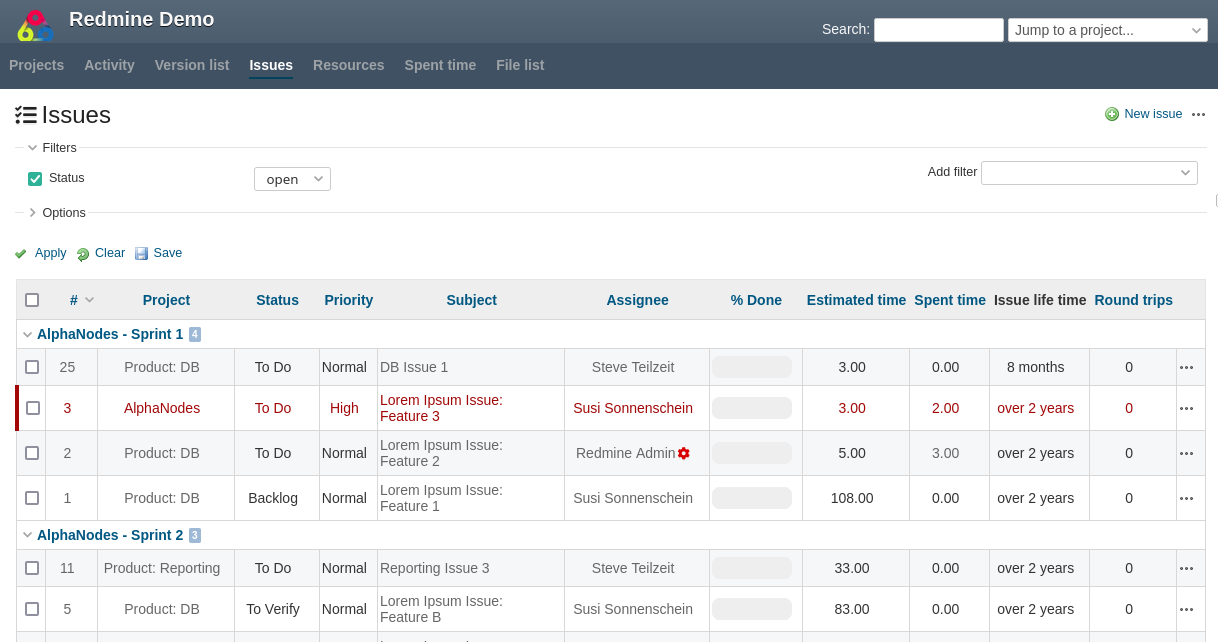
With the help of those filters you will find out, if there might be a problem with this issue. For example if the numbers / values are high (or not in the range you would want them to be) and it is still not resolved.
Tipp: Create counter boxes for those issues in order not to get them out of sight. Learn more in the following blog post: Project controlling with Redmine
4. Project list
To keep an eye on project budget and status take a look at the project list, which is equipped by the Reporting plugin with many additional features for that purpose.
Possible goals
The project list gives you an insight into the completion status of a whole project and the financial situation in connection with the spent time on issues:
- What is the current project progress?
- How much of the available budget has already been spent?
- Is the spent budget within the range? etc.
What you should do
Use the table list view and filter the list for your purpose and activate necessary columns and save them as custom query for later usage. Interesting filters and columns are, for example:
- Due issues
- Remaining budget
- Budget exceedance
- Issue progress etc.
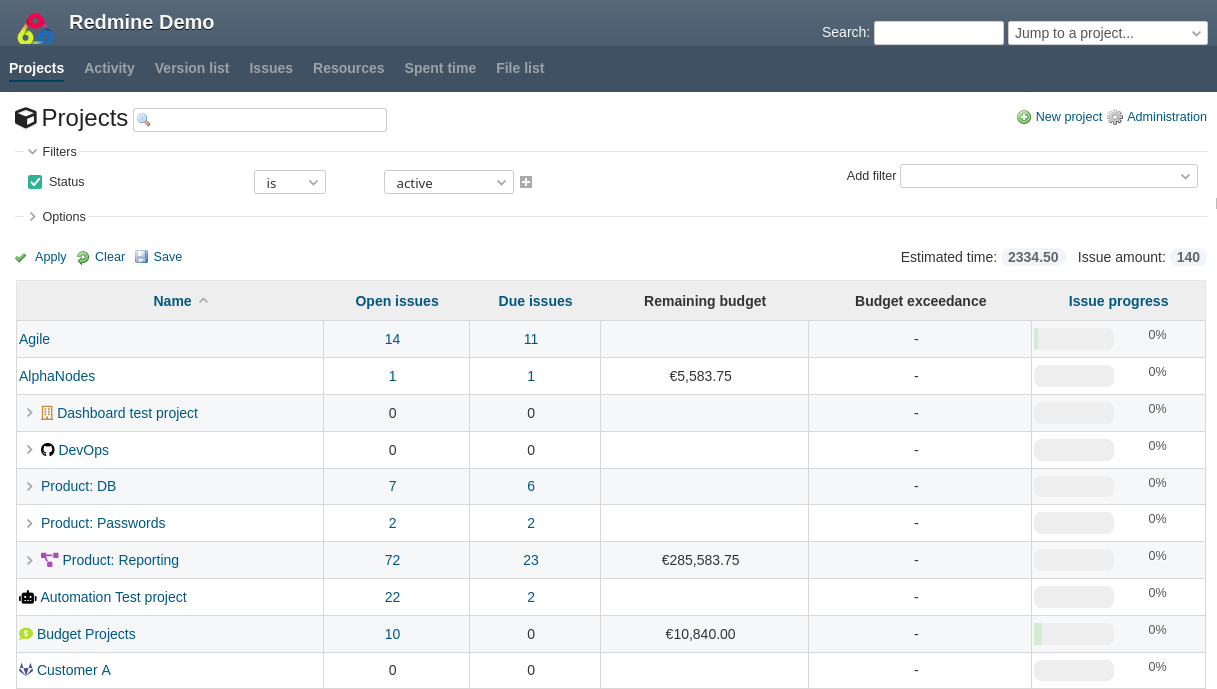
The Reporting plugin provides additional filters and graphical evaluations for the project page
Tipp: Create counter boxes for critical project metrics in order not to get them out of sight. Learn more on how to configure the project list in the following blog post: Frequently asked questions and answers about Redmine Reporting Plugin: How do I keep track of progress?
Useful Redmine HRM functions
Also the HRM plugin provides additional functionality for your standard Redmine, to detect problems based on time delays due to wrong estimation or too much day-to-day activities in combination with your user ressources. It makes Procrastination visible.
5. Resource planning view
To identifty problems regarding time delays and your ressources you can use the Resource planning view of the HRM plugin. It lists all your project members, who have been assigned to an estimated issue.
Possible goals
The HRM resource planning view gives you an insight into your team resources during a project and if there are bottlenecks due to time estimations on issues and the planned end date:
- Is everyone on the team appropriately utilized?
- Who has too many tasks, who too few?
- Is the planned end date realistically calculated?
- Are there problems with completion towards the end?
- Do you need additional resources so that the planned end date is not exceeded?
- Are there already problems in the individual time periods (versions)?
Learn more in the following blog post: Redmine HRM: Optimize workflows. Increase efficiency
What you should do
Check the planned hours view regularly and use the available functions to detect problems in advance like:
- Filter the view according to a specific time period (the current / next version) to see if you are in time currently
- Use the information provided by the info box Resource allocation problems / hints below and fix the detected problems early.
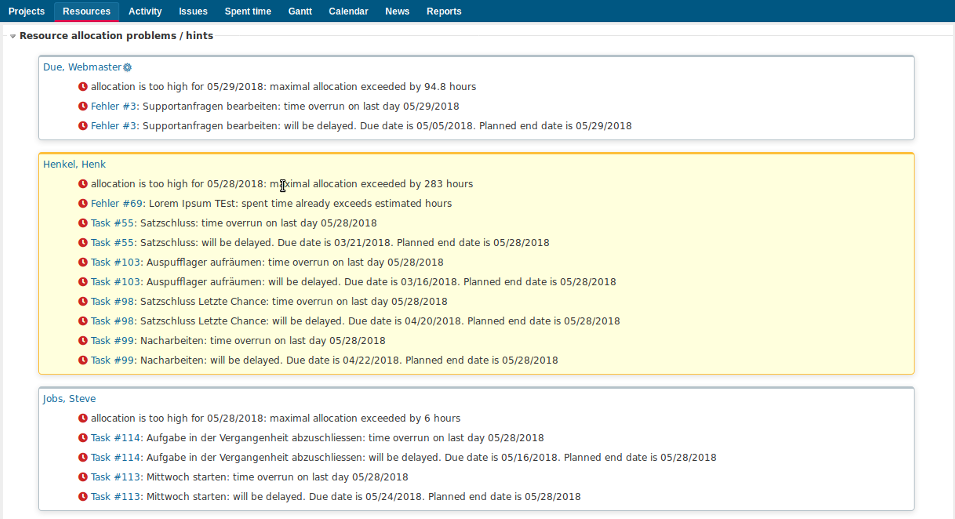
The mentioned tools on this page are commercial add-ons for the open source project management tool Redmine. All product information is available on the product page. The commercial plugin Bundle Business-Class contains both plugins (Reporting & HRM). Customers whose Redmine does not meet the minimum requirements or who prefer to hire someone to install and regularly maintain their Redmine instance have the alternative to book our Managed Application Hosting for Redmine, of which the plugin bundle is part of. Learn more on our hosting offer. The plugin functionality can be tested extensively in our online demo.
